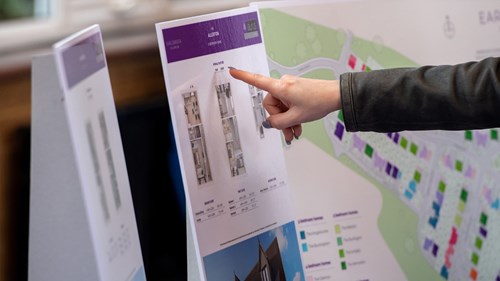9 house hunting tips for busy people to save time and stress
Finding your new dream home doesn’t have to be stressful. It doesn’t have to feel like a second full-time job either. But if you’re doing it all wrong, it will undoubtedly end up going this way, leaving you stressed-out, exhausted and fed up instead of excited for the possibilities that are out there for you.
We’ve picked out the top tips to help you house-hunt while saving yourself time, stress and even some money:
Determine your budget
You can then use a mortgage calculator to work out what you could borrow to pay for your new home, ruling out any homes that are out of your price range before you waste time finding them and falling in love with them.
Get your mortgage pre-approved (mortgage in principle)
The next step up from working out your budget is to formalise it by getting pre-approved for a mortgage before you start looking seriously. Mortgage calculators are useful tools, but until you have spoken to a lender and received pre-approval for how much they would give you, it’s not much more than guesswork.
At this point lenders will assess key factors such as:
- Your credit history
- Credit score
- Debt
- Employment history
- Income
- Assets and liabilities
Consider a new build
If you’re looking for a quicker and more stress-free house hunt, opting for a new build home is the way to go. There’s many reasons why buying a new build is a great option, not least that it simplifies the chain as there’s no-one currently in the home who you are waiting to move out. If you’re a first-time buyer, as soon as the home is ready, you can buy it and move in.
Finding the right new build for you can also be much more straightforward. If you find a development that you like, there will usually be several properties of various types and numbers of bedrooms/bathrooms available to meet your particular needs and wants, all in one place.

Make a list of your needs & wants
Does it need to be in the catchment area for good schools? Are green spaces important to you? How about ease of access to public transport and local services? A front garden? A driveway? Without knowing all of this, how can you really know what you’re actually looking for?
Decide on your non-negotiables (needs)
Realistically, you’re unlikely to find a home anywhere that gives you absolutely everything you want, so once you have your full list, you need to pick out the elements that any new home absolutely needs to have.
These can include the right number of bedrooms and bathrooms, or whether or not it has an open plan kitchen and dining space for socialising, or a nice garden for kids to play in. It would be the need for a space for remote working, especially if you’ve spent lockdown balancing your laptop on the ironing board.
The key here is to only pick out the elements that are completely essential for your everyday life, things that you’d regret not having if you bought a home without them.

Rank the others (wants) in priority order
Once that is done, everything else on the list will be your wants. These are nice-to-haves, and hopefully you’ll find a home that has as many of them as possible, but you could also live without them.
It’s a good idea at this stage to rank these wants in order of priority. A swimming pool might be near the bottom of the list, but an en-suite bathroom would probably be near the top, for example.
This doesn’t mean that you’re giving up on the lower priorities, but you’re acknowledging that you might find your dream home even if it doesn’t have all of them. But at least you can go into the search well informed about your priorities.
Research prices & shortlist areas
Once you’ve worked out what your budget is and what you want and need from your new home, the next step is to do your research into where you want to live. Knowing about the local area means you can avoid wasting valuable time viewing houses that aren’t in the right catchment area, for example.
Some of this research can be done online, checking prices on sites like Zoopla and Rightmove and keeping an eye on how long properties have been on the market in the area. If they’re going quickly, you need to be aware of this when planning offers, but if not, you need to consider why.
Actually visiting the area is important too, including going at various times in the day to see what it feels like during the day but also in the evening. Check out what shops are available, what green spaces and see how the area meet the wants and needs on your list.

Remain open-minded about locations & features
Before you start your house hunt you will probably have set ideas about where you would and wouldn’t like to live. But the reality is that you need to be flexible and willing to change those ideas depending on what you discover in your research and when you visit these places.
Some that seemed ideal could end up disappointing and others you wouldn’t have considered before could end up being much better than you expected. Keeping an open mind about locations and your wants and needs means staying open to the amazing opportunities that house hunting can bring.
Use the online property portals
Pre-internet, house hunting meant either driving around looking for some For Sale signs or standing outside estate agent windows. Today there’s so much more information available at your fingertips, so be sure to make use of it.
Property portals like Rightmove, Zoopla, OnTheMarket and Home and online estate agents like Strike, Purple Bricks and Yopa offer much more than property listings, with historic information on sales in the area, information about local schools and services and asking price comparison tools. Local estate agent websites to your area are worth checking too.
Set up Rightmove alerts
In fast-moving areas where properties go on sale and seem to get snapped up really quickly, it can be really stressful trying to stay on top of things. Have you ever seen your dream home on a listing site and realised that it’s already under offer? You can’t be constantly checking for new houses, but you can stay in the loop.
Setting up instant alerts on Rightmove for properties that fit your criteria means that you don’t have to miss out again while still having the time to deal with everything else you’ve got going on.

Reach out to the local estate agents
Make a strong first offer
Real life isn’t like Location, Location, Location so unless you’ve got Kirsty and Phil making the calls for you, it’s important to make sure your first offer for a property is a strong one, especially for homes in highly competitive areas. Going in low might feel like a gamble worth taking to save money but could also mean missing out altogether if you misjudge it.
CONCLUSION
There’s no magic way to make house hunting completely stress free. It’s a huge moment in your life and a decision that you need to get right, which makes it stressful. But by following these tips you can make sure that you’re giving yourself the best chance to find the right house without taking up too much of your time or giving you too many headaches.

